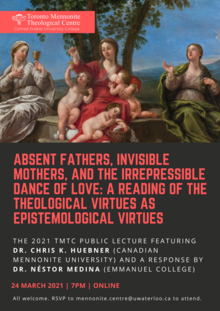About
The annual Toronto Mennonite Theological Centre (TMTC) Public Lecture showcases original research by Anabaptist Mennonite scholars and/or on Anabaptist Mennonite related topics in an ecumenical context on the campus of one of Canada’s major research universities. Emerging out of TMTC’s longstanding vision of being a Mennonite presence at the Toronto School of Theology, the lecture seeks to strengthen the relationships between TMTC and the many institutions and communities it serves.
2021 Public Lecture
The 2021 Toronto Mennonite Theological Centre (TMTC) Public Lecture was held on Wednesday, 24 March at 7pm EDT. Our lecturer is Dr. Chris Huebner, Associate Professor of Theology and Philosophy at Canadian Mennonite University, and we are delighted to have Dr. Néstor Medina, Assistant Professor of Religious Ethics and Culture at Emmanuel College, responding.
 Dr. Huebner's lecture is drawn from his larger ongoing project on martyrdom and is entitled "Absent Fathers, Invisible Mothers, and the Irrepressible Dance of Love: A Reading of the Theological Virtues as Epistemological Virtues.” Taking a cue from the philosopher Stanley Cavell, this lecture navigates the intersection of epistemology and ethics by way of an encounter with the mode of drama. Although Cavell does not himself put it this way, his generative readings of Shakespeare’s plays invite us to consider what it might mean to speak of the theological virtues as epistemological virtues. Focusing more specifically on the theological virtue of love or charity, this claim will be developed by bringing Cavell’s well-known reading of King Lear into conversation with another play that was written some 500 years earlier—the allegorical martyrdom drama Sapientia written by the medieval German canoness Hrotsvit of Gandersheim. Where Saptientia elaborates a theological vision of knowledge as a work of love, King Lear dramatizes the tragic consequences that can arise when love is viciously distorted. By attending to the way Cavell finds ethical and epistemological themes woven together in dramatic texts, focusing especially on his claim that modern epistemological approaches are often beset by a form of what he calls mother-denial, the lecture will conclude with some remarks on how we might conceive this theological dance of knowledge and love in a more specifically Mennonite context. How might some of the mothers whose stories are featured in early Anabaptist martyrdom literature contribute to this discussion?
Dr. Huebner's lecture is drawn from his larger ongoing project on martyrdom and is entitled "Absent Fathers, Invisible Mothers, and the Irrepressible Dance of Love: A Reading of the Theological Virtues as Epistemological Virtues.” Taking a cue from the philosopher Stanley Cavell, this lecture navigates the intersection of epistemology and ethics by way of an encounter with the mode of drama. Although Cavell does not himself put it this way, his generative readings of Shakespeare’s plays invite us to consider what it might mean to speak of the theological virtues as epistemological virtues. Focusing more specifically on the theological virtue of love or charity, this claim will be developed by bringing Cavell’s well-known reading of King Lear into conversation with another play that was written some 500 years earlier—the allegorical martyrdom drama Sapientia written by the medieval German canoness Hrotsvit of Gandersheim. Where Saptientia elaborates a theological vision of knowledge as a work of love, King Lear dramatizes the tragic consequences that can arise when love is viciously distorted. By attending to the way Cavell finds ethical and epistemological themes woven together in dramatic texts, focusing especially on his claim that modern epistemological approaches are often beset by a form of what he calls mother-denial, the lecture will conclude with some remarks on how we might conceive this theological dance of knowledge and love in a more specifically Mennonite context. How might some of the mothers whose stories are featured in early Anabaptist martyrdom literature contribute to this discussion?
A recording of the lecture is available online.




